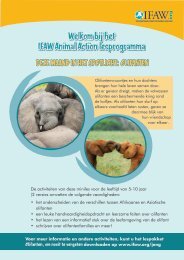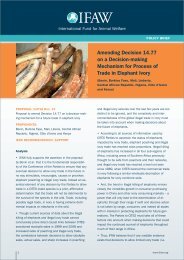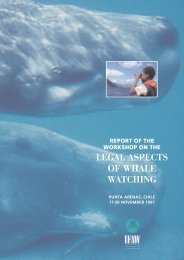Born to Be Wild - International Fund for Animal Welfare
Born to Be Wild - International Fund for Animal Welfare
Born to Be Wild - International Fund for Animal Welfare
Create successful ePaper yourself
Turn your PDF publications into a flip-book with our unique Google optimized e-Paper software.
© IFAW/M. Vorontsova<br />
Focus Country: Russia<br />
Amur tigers (Siberian tigers) once lived all<br />
across the Russian Far East and in<strong>to</strong> China<br />
and Korea. By the 1940s, they had all been<br />
hunted and killed except <strong>for</strong> a few in a small<br />
corner of Russia. People there worked hard<br />
<strong>to</strong> keep tigers alive in the wild, and their<br />
numbers slowly grew.<br />
Then, in the early 1990s, something<br />
changed. The number of these tigers started<br />
<strong>to</strong> drop, by as many as 70 tigers per year.<br />
One important reason was that poaching had<br />
increased in Russia.<br />
Every year, the city of Vladivos<strong>to</strong>k in the Russian<br />
Far East holds a Tiger Day celebration. It attracts<br />
thousands of people and encourages them <strong>to</strong> protect,<br />
not poach, the remaining wild tigers in Russia.<br />
IFAW supports tiger patrol<br />
teams that protect the Amur<br />
tigers remaining in the Russian<br />
Far East. There are fewer than<br />
300–400 tigers left in Russia.<br />
© Save The Tiger <strong>Fund</strong><br />
Tiger Cub Rescued<br />
IFAW and other groups in Russia<br />
recently helped save an orphaned<br />
wild tiger cub. The cub was fed<br />
special meals. It was trained<br />
<strong>to</strong> hunt and <strong>to</strong> keep away from<br />
humans. Six months later, it was<br />
released in a nature preserve.<br />
Most orphaned tiger cubs cannot<br />
be released after rescue; they lack<br />
skills needed <strong>to</strong><br />
survive.<br />
The cub<br />
was lucky<br />
<strong>to</strong> have<br />
a second<br />
chance at<br />
life in the<br />
wild.<br />
To fix this problem, the Russian<br />
government and several conservation groups<br />
created six teams of people <strong>to</strong> s<strong>to</strong>p the<br />
poaching. The results were amazing. In 1995,<br />
only 13 tigers were poached, followed by 18<br />
in 1996. The anti-poaching teams were a huge<br />
success.<br />
<strong>Wild</strong> tigers are still in trouble in Russia.<br />
Poaching is still a challenge. However,<br />
the anti-poaching teams and new laws are<br />
providing important protection <strong>for</strong> wild tigers<br />
in this region.<br />
Extinction Is Forever<br />
Tigers are very close <strong>to</strong> disappearing <strong>for</strong>ever<br />
if people do not work <strong>to</strong> protect them. It is<br />
encouraging that people from all the countries<br />
where tigers live are beginning <strong>to</strong> hold<br />
meetings about conserving tigers. But there<br />
is still work <strong>to</strong> do. People must cooperate <strong>to</strong><br />
protect tiger habitat, s<strong>to</strong>p poaching, and fight<br />
illegal sales of tigers and tiger parts so these<br />
magnificent wild animals can be saved.<br />
© IFA<br />
FF W<br />
AA /<br />
W W. Poole<br />
Younger Readers - Key Content Page 5

















